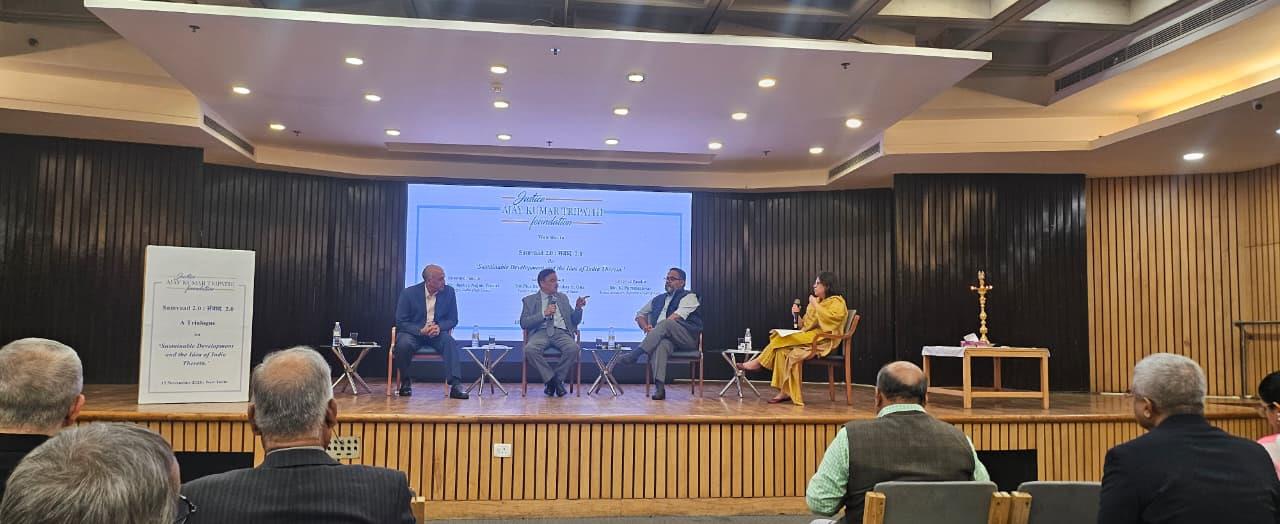
403
Sorry!!
Error! We're sorry, but the page you were looking for doesn't exist.
Justice Ajay Kumar Tripathi Foundation Hosts Samvaad 2.0 On Sustainable Development And The Idea Of India Therein
(MENAFN- ForPressRelease)
New Delhi, November 16, 2025 - The Justice Ajay Kumar Tripathi Foundation today hosted the fourth edition of their annual flagship event dedicated to reflective and public-spirited legal discourse on the "Idea of India." Held at the India International Centre, New Delhi, Samvaad 2.0 convened eminent jurists and legal thinkers to deliberate on the theme "Sustainable Development and the Idea of India therein." The discussion continues the Foundation's series of conversations exploring India's evolving constitutional identity, institutional roles, and democratic commitments.
Grounded in India's expanding environmental jurisprudence, the dialogue examined how constitutional principles, intergenerational equity, and ecological stewardship are shaping the country's development narrative. With the nation at a critical developmental crossroads 75 years after the Constitution came into force, the panel reflected on the embedding of sustainable development within India's constitutional fabric and the role of law and governance in upholding this vision.
Speaking at the event, Hon'ble Justice Abhay Shreeniwas Oka, Judge (Retd.), Supreme Court of India,saidthat,"Sustainable development must flow from the Constitution's idea of India - one that balances environmental protection with social justice. Planting a tree is like saving a life, and both citizens and the State share a duty to safeguard our forests, rivers, and air. At the same time, true development means ensuring affordable housing, healthcare, and education for all, not just building bigger roads and infrastructure. If we keep the Constitution's values at the centre, sustainable development becomes both a moral duty and a national responsibility."
Hon'ble Justice Najmi Waziri, Judge (Retd.), High Court of Delhi, referring to Delhi's pollution,stated"Any law is only as valuable as its real-world impact. Courts can pass progressive orders, but implementation often stalls because too many agencies are involved. What truly works is citizen action. We saw this in Delhi - people were eager to plant trees on their own. A retired soldier who was asked to plant 100 trees came back wanting to plant 500. Funds and institutions alone cannot drive environmental change. If we want results, it has to become a citizen-led movement, with each of us doing the least we can, even if it is simply watering the plants around us."
Mr. K. Parameshwar, Senior Advocate Supreme Court of India, remarked that "Sustainable development is not an abstract policy idea but a constitutional commitment that sits most naturally within Part IV of our Constitution. While courts have located environmental protections in Part III, this rights-based approach has often come at the cost of broader democratic participation, transparency, and institutional capacity. Much of our environmental governance today rests on delegated legislation and court-driven decision-making, leaving Parliament and citizens with limited roles. If we truly want sustainable development to serve present and future generations, we must strengthen our institutions and anchor environmental justice within the Directive Principles, where it can be both democratized and made more accountable."
The moderator, Ms. Shahrukh Alam, Advocate, Supreme Court of India, also emphasized, "Environmental justice is, at its core, a political question - about who gets clean air and water, who has access to land, and who gets to shape decisions about the city. Communities want a genuine voice in urban planning, because climate impacts are unequal and often fall hardest on those already marginalized. When demolitions or displacements protect some while harming others, it reveals a deeper imbalance. Sustainable development, therefore, must centre equity and real public participation, recognising thatpeople experience climate and development very differently."
The discussion reinforced the importance of placing constitutional values at the centre of India's developmental journey and underscored the need for thoughtful, inclusive, and sustainable approaches to governance. The Justice Ajay Kumar Tripathi Foundation remains committed to advancing public-spirited dialogue through Samvaad, strengthening its role as a platform that continues to shape and enrich conversations on the evolving Idea of India.
The Foundation was inaugurated on 27 November 2022, at New Delhi. Samvaad was the Fourth annual event of the Foundation. The functioning of the Foundation is overseen by Justice Tripathi's wife, Mrs. Alka Tripathi, as Founder and Trustee along with his daughters and son-in-law, Anushree Tripathi, Aditi Tripathi; Aakriti Tripathi, and Mr. Rahul Narayanan.
Grounded in India's expanding environmental jurisprudence, the dialogue examined how constitutional principles, intergenerational equity, and ecological stewardship are shaping the country's development narrative. With the nation at a critical developmental crossroads 75 years after the Constitution came into force, the panel reflected on the embedding of sustainable development within India's constitutional fabric and the role of law and governance in upholding this vision.
Speaking at the event, Hon'ble Justice Abhay Shreeniwas Oka, Judge (Retd.), Supreme Court of India,saidthat,"Sustainable development must flow from the Constitution's idea of India - one that balances environmental protection with social justice. Planting a tree is like saving a life, and both citizens and the State share a duty to safeguard our forests, rivers, and air. At the same time, true development means ensuring affordable housing, healthcare, and education for all, not just building bigger roads and infrastructure. If we keep the Constitution's values at the centre, sustainable development becomes both a moral duty and a national responsibility."
Hon'ble Justice Najmi Waziri, Judge (Retd.), High Court of Delhi, referring to Delhi's pollution,stated"Any law is only as valuable as its real-world impact. Courts can pass progressive orders, but implementation often stalls because too many agencies are involved. What truly works is citizen action. We saw this in Delhi - people were eager to plant trees on their own. A retired soldier who was asked to plant 100 trees came back wanting to plant 500. Funds and institutions alone cannot drive environmental change. If we want results, it has to become a citizen-led movement, with each of us doing the least we can, even if it is simply watering the plants around us."
Mr. K. Parameshwar, Senior Advocate Supreme Court of India, remarked that "Sustainable development is not an abstract policy idea but a constitutional commitment that sits most naturally within Part IV of our Constitution. While courts have located environmental protections in Part III, this rights-based approach has often come at the cost of broader democratic participation, transparency, and institutional capacity. Much of our environmental governance today rests on delegated legislation and court-driven decision-making, leaving Parliament and citizens with limited roles. If we truly want sustainable development to serve present and future generations, we must strengthen our institutions and anchor environmental justice within the Directive Principles, where it can be both democratized and made more accountable."
The moderator, Ms. Shahrukh Alam, Advocate, Supreme Court of India, also emphasized, "Environmental justice is, at its core, a political question - about who gets clean air and water, who has access to land, and who gets to shape decisions about the city. Communities want a genuine voice in urban planning, because climate impacts are unequal and often fall hardest on those already marginalized. When demolitions or displacements protect some while harming others, it reveals a deeper imbalance. Sustainable development, therefore, must centre equity and real public participation, recognising thatpeople experience climate and development very differently."
The discussion reinforced the importance of placing constitutional values at the centre of India's developmental journey and underscored the need for thoughtful, inclusive, and sustainable approaches to governance. The Justice Ajay Kumar Tripathi Foundation remains committed to advancing public-spirited dialogue through Samvaad, strengthening its role as a platform that continues to shape and enrich conversations on the evolving Idea of India.
The Foundation was inaugurated on 27 November 2022, at New Delhi. Samvaad was the Fourth annual event of the Foundation. The functioning of the Foundation is overseen by Justice Tripathi's wife, Mrs. Alka Tripathi, as Founder and Trustee along with his daughters and son-in-law, Anushree Tripathi, Aditi Tripathi; Aakriti Tripathi, and Mr. Rahul Narayanan.
Company:-Visage11 Advisors Pvt. Ltd.
User:- Amitabh Kumar
Email:[email protected]

Legal Disclaimer:
MENAFN provides the
information “as is” without warranty of any kind. We do not accept
any responsibility or liability for the accuracy, content, images,
videos, licenses, completeness, legality, or reliability of the information
contained in this article. If you have any complaints or copyright
issues related to this article, kindly contact the provider above.


















Comments
No comment